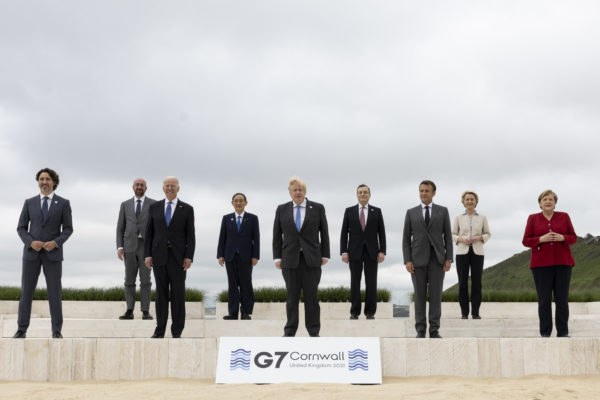
by Rachel Ansley
The pledge by G7 leaders to donate one billion COVID-19 vaccine doses to countries in need is laudable, but must be coupled with a strategy to ensure equity, integrity, and transparency of distribution campaigns, according to PTF advisers.
From June 11-13, 2021, leaders from the Group of Seven (G7) countries gathered in Cornwall for the annual summit. Participating countries include the United States, United Kingdom, Canada, Germany, Japan, France, and Italy. At this summit, they pledged to collectively donate one billion COVID-19 vaccine doses to low- and middle-income countries around the world. Doses will be shared either directly with recipient governments, or through global vaccine-sharing initiatives such as COVAX, co-led by the World Health Organization (WHO), Gavi, and the Coalition for Epidemic Preparedness Innovations. The distribution of doses will contribute to the G7’s goal of inoculating the world’s population of 8 billion people by the end of 2022.
Though the move has garnered praise as a step in the right direction, it has also accumulated criticism. UN Secretary General Antonio Guterres joined many health experts and anti-poverty campaigners in calling for a greater “sense of urgency” from the G7 leaders. In short, critics claim, one billion doses and a two-year timeline is simply not enough.
Moves made with urgency must also pay attention to equity. Affluent countries provided aid to those who needed it to cope with the pandemic, yet the speed and scale of pandemic response programs led to sidestepping of traditional anti-corruption guardrails. As a result, a portion of international funding remains unaccounted for. Already, elite capture scandals around the world indicate a potential similar pattern with vaccines in which those with the means to do so bypass vaccine prioritization systems and secure doses for close contacts. Without a plan for transparency and accountability of vaccine distribution, help will not reach those who need it most.
Global leaders and international coalitions should turn to a key group able to help close the gap between governments and citizens and ensure equitable vaccine distribution: civil society organizations (CSOs). Due to their positions of influence within their communities, CSOs are uniquely placed to assist with emergency response work. Over the past year, PTF has worked closely with civil society partners in Uganda, Argentina, India, and Ghana to implement COVID-19 response programs that capitalize on citizen engagement to hold governments accountable. Many of these projects have now transitioned to work on third-party monitoring of COVID-19 vaccine distribution. With this experience, PTF’s partners, and other CSOs around the world, can apply their methodology to ensure citizen engagement in and transparency of vaccination campaigns.
The leaders of G7 countries have taken an important step forward in ensuring global access to COVID-19 vaccines. Now they must work with governments of the recipient countries to ensure transparent distribution and equitable access, and civil society can help.
PTF Advisers reacted to the G7’s pledge, and its impact for global vaccination campaigns. Read their analysis below:
Vinay Bhargava, Chief Technical Adviser
“The G7 pledge is good news for one out of five persons at risk of COVID-19 infection. However, covering at least four out of five persons is necessary for economies to fully reopen and address the growing poverty and inequality.”
Judy Edstrom, Adviser
“Emergency programs, including emergency procurement and distribution, are often fraught with insider deals, elite capture, and unfair treatment of poorer people who lack the information or power to demand their rights. In these situations, citizen groups can help ensure transparency, accountability, and access of vulnerable populations to the vaccinations the G7 donors seek to provide.”
Barbara Kafka, Adviser
“The pledge by G7 countries to donate one billion free vaccine doses is a start in rectifying the current significant inequalities in countries’ vaccine access. Many more doses are still needed. Then it will be up to each country to ensure that internal access is also equitable and the vulnerable are not left out.”
Daniel Ritchie, Co-Founder and Former President
“While the commitment is welcome and urgently needed, the major challenge now is to ensure these vaccines reach the most vulnerable—the poor, the sick, the hard-to-reach rural communities—and not just the politicians and well-to-do urban elites that have typically benefitted most from the early rounds of vaccinations. Civil society organizations have a critical role to play in helping the reach the most vulnerable.”
Richard Stern, President
“The news that the G7 will provide one billion doses of COVID vaccines to developing countries is very welcome. However, multiples of that amount will be required to vaccinate the populations of the poorest countries, and it is vital that additional actions be promptly enacted to generate the necessary production.”
The views expressed in this article are solely those of the individuals quoted and do not necessarily reflect the official policies of PTF.
You can follow the Partnership for Transparency on Twitter @PTFund and on Facebook at Partnership for Transparency Fund.

